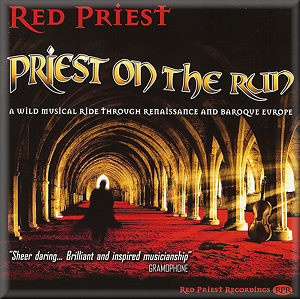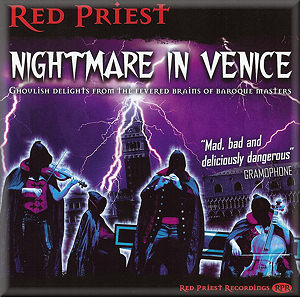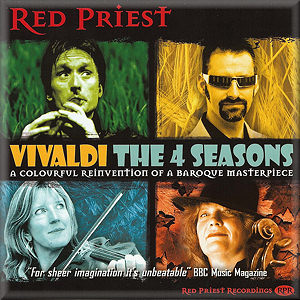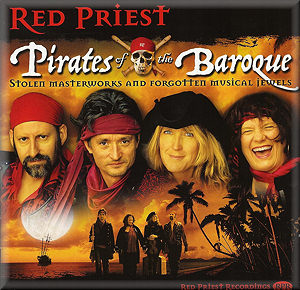 Red
Priest – Priest on the Run
Dario CASTELLO
(c.1590-c.1630)
Red
Priest – Priest on the Run
Dario CASTELLO
(c.1590-c.1630)
Sonata Terza (Book 2) [5:14]
Diego ORTIZ
(c.1510-c.1570)
Two Ricercadas [3:14]
Georg Phillip
TELEMANN (1681-1767)
Gypsy Sonata in A minor [9:40]
Fantasia fro viola da Gamba [4:42]
Luis De NARVÁEZ
(c.1500-1555)
Canción del Emperador [3:29]
ANONYMOUS
Renaissance Revels (Venice, 1551) [2:41]
Bartolomeo de
SELMA E SALAVERDE (1580-1640)
Canzona Prima [5:46]
Johann Heinrich
SCHMELZER (c.1620-1680)
The Cuckoo Sonata [4:31]
Marco UCCELLINI
(1610-1680)
La Bergamasca [3:08]
Henry PURCELL
(1659-1695)
Two in One upon a Ground [3:30]
Georg Frideric
HANDEL (1685-1759)
Op.2 No.1 - Aria Amoroso [2:58]
Maurizio CAZZATI
(c.1620–1677)/Claudio MONTEVERDI
(1567-1643)
Zefiro’s Ground [3:52]
Antonio VIVALDI
(1678-1741)
Concerto in D major RV92 [9:59]
Red Priest (Piers Adams (recorders); Julia
Bishop (violin); Angela East (cello); Julian Rhodes (harpsichord))
rec. Forde Abbey, Somerset, March 1998
RED PRIEST RECORDINGS RP001 [63:09]
The slew of Red
Priest’s recordings originally issued on Dorian has now reappeared
on its own label. The artwork is thoroughly revamped, with
emphasis on the bold and eye catching. And as this disc also
shows, Red Priest has a taste for thematic revamping as much
as textual working; some of the works here have had their
titles sexed up the better to play the group’s trump card
– fizzing articulation, devilishly fast speeds, interpolations
from other musics, ribald and raucous vocalising and the occasional
fade ending. This disc was their first, and it’s the only
one to feature the original line up, harpsichordist Julian
Rhodes having died tragically young at thirty-six.
The disc’s title
is an amusing narrative device to take us from locale to locale,
to cover national and geographic ground. And of course with
this group the vivid playing invariably sparks excitement
and engagement. Castello’s Sonata is for instance a vortex
of powerful contrasts in tempo and accentuation with Julia
Bishop brandishing a fizzingly fast bow and fingers whilst
the virtuoso and eminence grise of the group, recorder
player Piers Adams, articulates with such pin point accuracy
that it raises the hair shirt on one’s back. Too quick? Well,
yes, almost certainly but breathless excitement is guaranteed.
Angela East plays
warmly in Diego Ortiz’s Two Ricercadas where we find
Rhodes announcing the second piece with energizing idiosyncrasy.
She also takes centre stage in the Telemann Fantasia for viola
da gamba. The so-called Gypsy sonata of Telemann is
a study in vivacity and corresponding sensitivity with its
finale in particular full of brilliant accelerandi, a Tzigane-like
cadenza and celebratory shouts to end. The group feats on
contrasts. We catch their genuinely expressive and restrained
Narváez Canción and can appreciate that for all their
aerial Cirque du Soleil vaunting they possess powerful sensitivity.
Next they provide a Renaissance dance of earthy demotic power.
And for all the turbo-charged accelerandos and vertiginous
dynamics embedded in their performance of the Canzona Prima
of Bartolomeo de Selma e Salavede the element of sure sensitivity
runs through it too, like a sub-stratum. The concluding Vivaldi
Concerto – from which composer the group obviously takes its
name – is a dazzlingly fast affair, with daemonic lurches.
It ends a recital
that was recorded over a decade ago now but which launched
the group on its genre-bending trajectory.
Jonathan
Woolf
 Nightmare
in Venice
Nightmare
in Venice
Antonio VIVALDI (1678-1741)
The Nightmare Concerto (
La Notte) in G minor RV439
[8:46]
Concerto grosso in A minor RV522 [9:50]
Robert JOHNSON (1583-1633)
The Satyrs’ Masque [2:29]
The Flatt Masque [1:58]
The Witches’ Dance [1:54]
Nicholas LESTRANGE (1603-1655)
The Furies [2:03]
Giovanni Paolo CIMA (c.1570-1622)
Sonata a Tre in A minor [3:16]
Henry PURCELL (1659-1695)
Suite from
The Fairy Queen
Prelude/Rondeau [4:28]
Fairy Dance [0:46]
Dance of the Savages [1:35]
Dance of the Followers of Night [2:52]
Chaconne [2:38]
Dario CASTELLO (c.1590-c.1630)
Sonata Decima (Book 2) [5:26]
Jean-Marie LECLAIR (1697-1764)
Scylla et Glaucus; Demon Airs 1-3 [4:56]
Simphonie [0:34]
Arcangelo CORELLI (1653-1713)
Fantasy on Corelli’s
La Folia arranged by Red Priest
Red Priest (Piers Adams (recorders); Julia Bishop (violin);
Angela East (cello); Howard Beach (harpsichord))
rec. Françoys-Bernier concert hall, Domaine Forget, Saint-Irénée,
Québec, May 2001
RED PRIEST RECORDINGS RP002 [65.54]
Previously on
Dorian DOR 90305 this is another of Red Priest’s recordings
to be reissued on their own distinctive and eye-poppingly
lurid label. As with the re-release of Vivaldi’s Four Seasons
I came, I saw, I re-listened to all I written in my review
and once again agreed with my perspicacity.
Red Priest, the
Cirque du Soleil of baroque performance ensembles, is back.
Their first CD, Priest on the Run, gave us thunder bestrewn
Vivaldi, Handel, Purcell, Telemann and others - and now they
reprise their namesake Vivaldi, as well as Purcell, but add
an English Fantasy suite (principally Robert Johnson but also
one piece by the little known Nicholas LeStrange) adding a
dash of Castello and Cima, and a soupçon of Leclair. Their
finale is an outrageous Fantasy on Corelli's La Folia in the
version for recorder and continuo and one guaranteed to shake
the very bones of those generations of departed violinists
who essayed it in the original version in rather more - shall
we say - genteel fashion.
Since that last
CD Howard Beach has replaced Julian Rhodes who died, aged
only thirty-seven, in 2001. Otherwise Piers Adams plays the
recorders, Julia Bishop the violin (and some banshee wailing
of which more below) and Angela East is the cellist. The rationale
for this disc is the fantastic. The Nightmare Concerto of
Vivaldi was originally written for flute or recorder and string
orchestra and has been arranged by the group, as have other
items here. Vivaldi's Concerto Grosso in A minor (from L'Estro
Armonico) acts as the centrepiece of the recital, once more
in a small ensemble reduction - though it hardly fits the
bill in terms of the ghoulish schema Red Priest enact elsewhere.
But it does act as a healing refuge at least from Cima's Sonata
a Tre, written in the then current Stylus Phantasticus, and
the other devilish goings-on in this characteristically dramatic
production.
We are immediately
plunged into the grotesquery of Vivaldi's La Notte in which
virtuosity, finesse and crazed sonorities evoke the nocturnal
phantasmagoria of a truly fervid imagination. The jagging,
jutting and sawing are writ huge in this performance and my
main concern centres on the sonorities in the Chase, the final
movement, in which things seem to get rather overheated. The
so-called English Fantasy Suite opens with Johnson's suitably
devilish Satyr's Masque but also features an aspect of Red
Priest's recorded performances to which I'm less sympathetic
- the fade out ending (and it's not the only example). In
LeStrange's The Furies Piers Adams unleashes a veritable torrent
of dramatically vibrated flute playing; it's reminiscent in
Red Priest's arrangement of South American pipe music and
in The Witches' Dance we have a surfeit of Frank Zappa gnawing
and gnarling string playing - which is contrasted with an
elegant folk-like simplicity (topped by the hag-like wails
of Julia Bishop). The inherent theatricality, the juxtaposed
sonorities and stylistic clashes are all Red Priest's now
accustomed province but some sensitive baroque ears will need
a health warning before this disc is removed from the shrink
wrap.
However Cimas's
Sonata a Tre opens in sensitive fashion - desolate and full
of feeling - the yelp at 2.30 is another side of the work's
nature and maybe Red Priest's as well. The Concerto Grosso,
a short three-movement work, begins with tasteful ebullience
- these players have plenty of sensitivity when required and
quite plainly considerable reserves of technical prowess as
well - before some shimmering harpsichord playing launches
Piers Adams' recorder. Howard Beach seems to thrum the harpsichord
in the concluding Allegro - a kind of running water effect
and delicious - over which first the skittering violin and
then the expressive cello make their entries. They certainly
don't stint the horror in the Dance of the Followers of Night
from Purcell's The Fairy Queen - string bulges galore, recorder
billowing. In Castello's Sonata Decima they seize on the potential
for powerful contrast - lissom elegance and dramatic roistering
sonorities - but the effect, to me anyway, is really rather
pulverising. Red Priest have through long experience of baroque
performance practice internalised such features as dramatic
dynamic contrasts and giddying tempi and it is well within
their capacity to detonate a work in this way. Whether it's
to the advantage of the work is a moot point.
Still there's
little denying the vivacious wit (albeit with thunderous cello
accents) of Leclair's Demon Air No. 2 or the shuddering aerobatics
of the Simphonie. Now about the Fantasy: the notes are cagey
but this is what I hear, some of it at least. It opens by
presenting the spine of the melody, then continues with crypto
exchanging of twos (in jazz terms), overblown embouchure work
on the recorder, a pause for the solemn appearance of the
Elgar Cello Concerto (it's true folks), a slide so garish
I suggest you listen with mufflers in a darkened room, some
middle eastern cornucopia, a visit to sunset in Khartoum (I
couldn't make it up - special bow for recorder and harpsichord),
a Greek wedding dance, slapped bass à la Pops Foster (Angela
East the cellistic culprit) and - bear with me, it's nearly
over - a guest appearance by the ghost of Artie Shaw and his
Gramercy Five (welcome back Johnny Guarnieri). Oh yes and
flutter tonguing, Bach and some rapacious heavy rock. Well,
it's not Arthur Grumiaux that's for sure. But that is Red
Priest - entertaining, naughty, I'm not entirely sure I could
live with it on disc but I'll be sure to be at their next
concert.
Jonathan
Woolf
 Antonio
VIVALDI (1678-1741)
Antonio
VIVALDI (1678-1741)
The Four Seasons (Le Quattro Stagioni) (1720)
(arr. Red Priest) [39:15]
Arcangelo CORELLI (1653-1713)
The Christmas Concerto (Concerto grosso in G minor
Op. 6 No. 8 Fatto per la Notte di Natale (arr. Red
Priest) [11:16]
Red Priest (Piers Adams (recorders); Julia Bishop (violin);
Angela East (cello); Howard Beach (harpsichord))
rec. Troy Savings Bank Music Hall, Troy, New York, January
2003
RED PRIEST RECORDINGS RP003 [50.33]
This is a re-issue. It was first released
on Dorian DOR 90317 in which guise I first reviewed it and
is now re-released on Red Priest’s own distinctive, not to
say eye catching label. Having listened again I find myself
in the satisfactory position of agreeing with everything I
wrote.
To the cry "Not
another Four Seasons" should be added the rejoinder "Yes,
but this is Red Priest's Four Seasons." This audacious
ensemble - in my last review I called them the Cirque du Soleil
of baroque performance groups - has recomposed the work in
its own compositional image the better, they say, to shock
us into recognising in the music the sheer novelty and drama
that familiarity has long since bred out of it. The solo line
therefore goes, usually, to Piers Adams' recorder in various
pitches, including a modern alto recorder. Because Red Priest
is a quartet they've abandoned the solo/tutti contrast and
have gone instead for a chamber ensemble but have varied the
line to promote sufficient contrast. The result is variously
engaging, vexing and exciting.
Fabio Biondi and
Alice Harnoncourt have in their violinistic way staked out
the ground for radical reinterpretation of the Four Seasons
in a supposedly historically informed way. Still, as we all
know - or as we all should know - today's historically informed
performance is tomorrow's fish and chip packet. When the first
recording of the Four Seasons was made in Rome in 1942 by
an orchestra under Bernardino Molinari doubtless they all
thought it was an approximation of Vivaldian style and performance
practice. So I have no axe to grind on the question of Red
Priest's very individual reinvention. Their performance is
less a Monet than a Jackson Pollock. Their birds in the Spring
are pugnacious, the hoarse dog as explicit as a Turner sun,
the shouted "hoy" in the Pastoral Dance a rusticity
that lacks only peasant togs to complete the aural-visual
axis on which this performance is predicated.
So, Red Priest
being the mavericks they are, the barking dog reappears -
I assume on the Franckian cyclical principle - in Summer and
there the storm breaks with Miltonic flourish. In Autumn there
are hints that the demon drink has got to the peasants even
before the music has begun. The foursome characterise everything
with a vigour bordering on mania; the hunt with its smacking
great pizzicati is one instance and - hey - what a neat touch,
a fade out ending at the end of the Allegro. Groovy.
The frost bit
so hard in Winter that I doubted there was an Imperial grain
of rosin on their baroque bows but then come the Largo and
what do we have? Why, a Calypso-reggae guitar backbeat and
a curvaceous solo violin line as sinuous and enticing as a
bare foot bikini girl on a tropical beach. Sharp ears will
note that the geographical influences extend from Club Tropicana
and Barbados in a politically inclusive way to include touches
of Roby Lakatos to whom Julia Bishop has undoubtedly been
listening. If she hasn't been listening to him I'll send her
a cheque for £50 and my compliments. And so to the very visualised
icefalls of the concluding Allegro and a recording at once,
I have to say, simultaneously sui generis and bananas.
It seems anti-climactic
to note that the Corelli Christmas Concerto is almost a matter
of rectitude by comparison. The first Adagio is flowing and
sensitive and has a swinging Allegro section attached, the
penultimate Allegro is brisk and brilliant and the Pastorale,
well, it certainly has its share of Red Priest grotesquerie.
Parental guidance stickers should have been supplied.
Obviously I can't
make much of a conventional recommendation given the unconventional
nature of the performances but as ever with Red Priest one
is, rather like going down to the woods, in for a big surprise.
Jonathan
Woolf
Red Priest – Pirates of the Baroque
 Jean-Marie
LECLAIR (1697-1764)
Jean-Marie
LECLAIR (1697-1764)
Tambourin [2:22]
Giovanni Paulo SIMONETTI
Sonata in C minor Op.5 No.2
La Burrasca [8:23]
Tomasso ALBINONI (1671-1751)
Adagio adapted by
Remo GIAZOTTO
(1910-1998) [8:05]
François COUPERIN (1668-1733)
Suite; from Ordres as ‘Pirates of the Baroque’ assembled by
Howard Beach [18:05]
Antonio VIVALDI (1676-1741)
Concerto Grosso in D minor RV 565 [8:39]
Concerto in G major La Tempesta di Mare RV 433 [6:23]
Tomasso VITALI (1665-1717)
Chaconne [8:38]
Giuseppe TARTINI (1692-1770)
Senti Lo Mare [3:43]
Red Priest (Piers Adams (recorders); Julia Bishop (violin);
Angela East (cello); Howard Beach (harpsichord))
rec. Champs Hill, nr Petworth, November 2006. DDD
RED PRIEST RECORDINGS RP004 [65:02]
Now that Red Priest
has control of its own discs it can set sail boldly into the
marketplace. The intrepid quartet has donned piratical garb
for a full-on visual assault with only a cheekily tenuous
connection with the legacy of Blackbeard and Henry Morgan
and their confreres. Of the foursome only Howard Beach really
looks menacing enough to shiver any timbers though I wouldn’t
mind being cooped up in the fo'c'sle with Julia Bishop.
Back on deck we
have a programme to consider. It’s the usual Red Priest ration
of cheeky, jaw-dropping, sensitive and virtuosic pan-stylistic
meta-display. Leclair’s evergreen Tambourin is divided up
between violin and recorder and that includes some skittering
folkloric moments into the bargain. Simonetti’s Sea Storm
sonata blazes in this performance with powerful fervour and
makes much of the strong internal contrasts. Albinoni’s Adagio,
here correctly co-attributed to Remo Giazotto, emerges RedPriested,
starting out with a bass intro, adding some gypsy fiddle,
hints of Tango Nuevo, and an especially passionate harpsichord
run. This pottage works well for those who like the irreverence.
The centrepiece
is a so-called Pirates of the Baroque suite, one actually
complied from Couperin’s Ordres by the piratical-looking
Beach. This is enlivened by some disorderly moments – a raucous
vocal blast of Why Do The Nations? for instance and
canon shot, and a witty pay off drift to slumber. No peace
for the wicked here when Red Priest is on the horizon.
Vivaldi’s D minor
Concerto Grosso moves from the desolate to the warm. Vitali’s
Chaconne is characteristically fluid and sonority packed,
full of rich voicings and colour. For all the dynamics variations
and theatrical devices, the seismic shifts of the articulation,
ricocheting and vitalising, these are at heart four sensitive,
technically highly accomplished musicians. They couldn’t play
with such pinpoint verve if they weren’t. So I don’t mind
their interpolations – the hornpipe in Vivaldi’s La Tempesta
di Mare for instance; in fact it’s often great fun.
Catch them in
concert and on disc too; there’s no one quite like them.
Jonathan
Woolf




 All Nimbus reviews
All Nimbus reviews








